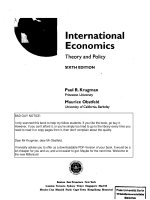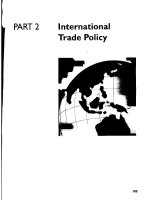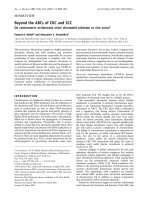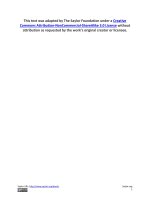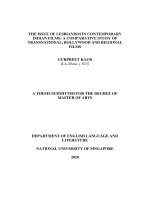beyond the ivory tower international relations theory and the issue of policy relevance
Bạn đang xem bản rút gọn của tài liệu. Xem và tải ngay bản đầy đủ của tài liệu tại đây (1.08 MB, 243 trang )
Beyond the Ivory Tower
Beyond the Ivory Tower
International Relations Theory and the Issue
of Policy Relevance
Joseph Lepgold and Miroslav Nincic
columbia university press new york
columbia university press
Publishers Since 1893
New York, Chichester, West Sussex
Copyright ᭧ 2001 Columbia University Press
All rights reserved
Library of Congress Cataloging-in-Publication Data
Lepgold, Joseph.
Beyond the ivory tower : international relations theory and the
issue of policy relevance / Joseph Lepgold and Miroslav Nincic.
p. cm.
Includes bibliographical references and index.
ISBN 0-231-11658-6 (cloth : alk. paper) — ISBN 0-231-11659-4 (pbk.
: alk. paper)
1. International relations. 2. Diplomacy. 3. International
relations—Philosophy. I. Nincic, Miroslav. II. Title.
JZ1305 .L36 2002
327.1Ј01—dc21
2001047011
A
Columbia University Press books are printed on permanent and durable
acid-free paper.
Printed in the United States of America
c10987654321
p10987654321
To Alexander L. George, with admiration and fondness
Contents
Preface ix
1. The Theory-Practice Gap in International Relations 1
2. Types of Knowledge and Their Practical Uses 28
3. How Knowledge Is Acquired and Used 55
4. Scholarship and Relevance: Is There a Tradeoff? 81
5. The Inter-Democratic Peace—Theoretical Foundations
and Policy Implication 108
6. International Institutions and International Cooperation:
Theoretical Foundations and Policy Implications 138
7. Useful Knowledge: Value, Promise, and Limitations 172
Notes 187
Index 215
Preface
This book stems from a sense of unease with the current state
of theory and research in international relations. It is rooted in a conviction
that knowledge in this area must be judged by two criteria: its scholarly
soundness and its policy relevance. The conviction stems not so much from
a sense of social obligation as from a feeling that the study of international
relations and foreign policy implies, by its nature, relevant knowledge, and
that scholarship explicitly seeking to be relevant is likely to be good (perhaps
better) scholarship. This is not a fashionable position, but it is entirely de-
fensible. A failure to see this, we believe, is grounded in an unacceptably
emaciated conception of relevance, in an overly simplistic view of how rele-
vant knowledge is produced and conveyed, and in a misconceived notion
of the scholarly merits of relevant knowledge. We hope that this volume may
lead to the revision of some flawed assumptions and encourage greater ac-
ademic receptivity to work that is both useful and sound.
The project took shape in a panel at an annual meeting of the American
Political Science Association. Since then, it has occupied much of our time
and thinking. As is always the case with such projects, we have benefited
from the interest and advice of a number of colleagues. We would like, in
particular, to thank Alexander George, who recently rekindled the profes-
sion’s interest in the issue of relevant scholarship. Bruce Jentleson, a fine
example of professor-practitioner, has been a friend and source of advice to
x Preface
both of us. Larry Berman, Emily Goldman, Donna Nincic, and George
Shambaugh read and commented on several draft chapters.
Joseph Lepgold
Miroslav Nincic
May 2001
Beyond the Ivory Tower
1
The Theory-Practice Gap
in International Relations
It is by action—in my terms, by the practice of politics—that
theory . . . can be kept in touch with reality. Thetwoareinseparable; theory
and practice being complementary, they constitute harmonic aspects of one
whole.
1
—Paul H. Nitze
It is natural to assume that, of all the institutions focusing on
public policy, the free realm of the universities would have the most to offer in
knowledge and insight. Challenges to conventional wisdom and provocative
explorations of international issues not possible in the political world should be
and are part of the domain of the scholar and teacher. [Yet]much of today’s
scholarship is either irrelevant or inaccessible to policy makers. . . . much
remains locked within the circle of esoteric scholarly discussion.
2
—David D. Newsom
. . . the more [scholars] strain for policy relevance, even if only
to justify our existence in the eyes of society at large, the more difficult it
becomes to maintain intellectual integrity.
3
—Christopher Hill
The first two observations, both from distinguished former
U.S. officials, typify many policymakers’ views about contemporary schol-
arship in international relations: while it ought to be useful to practitioners,
little of it is. Much, they believe, is useless and arcane. These particular
statements are striking because they do not reflect ignorance about the mis-
sion and culture of university scholars. The individual quoted in the first
passage has written widely on foreign policy and helped to found the Johns
2 The Theory-Practice Gap in International Relations
Hopkins School of Advanced International Studies, one of America’s pre-
mier professional schools of international affairs. The author of the second
passage held a faculty position at the University of Virginia and was Acting
Dean of Georgetown University’s School of Foreign Service. The book in
which the second passage appeared was published by a university press and
was addressed to a largely academic audience. Indeed, much of the chapter
from which the second passage was taken betrays keen disappointment that
scholarly writing on international affairs does not speak more clearly to the
many uncertainties and daunting analytic tasks practitioners face. The au-
thor of the third passage, a professor at the London School of Economics,
offers a view common among international relations scholars—that they will
lose professional independence and credibility by trying to speak about prac-
tical issues.
Such sentiments, however, have become common only in the last few
decades. As readers of Machiavelli, Hobbes, and Hobson appreciate, theory
in the study of politics, including world politics, has traditionally been in-
tended to guide practice. Diplomats of earlier generations would have found
quite odd the notion that university scholars who studied international re-
lations had little of interest to say to them. Important examples of such
influence are not hard to find. Several generations of post-World War II U.S.
officials had much of their general worldview formed or reinforced by ex-
posure to Hans Morgenthau’s stark Realpolitik in Politics Among Nations.
During the 1970s, models that focused on the catalysts and implications of
transnational economic forces had a comparable, if more limited, impact
on official thinking. From the late 1950s onward, the important conceptual
literature on arms control—work derived from theories focused on un-
intended conflict spirals—had an impact on key aspects of U.S. nuclear
weapons deployments, investments in the command-and-control apparatus,
and operational nuclear doctrines. Since this work focused on the interplay
between military postures and the likelihood of inadvertent war, it gave
policymakers a coherent way to diagnose an important problem as well as
manipulable levers—tacit and formal measures to promote invulnerable nu-
clear forces—through which they could try to deal with it.
4
For many reasons, connections between scholarly ideasand policymakers’
thinking in international relations are less common today, and the gap may
grow unless we rethink carefully our approach to policy relevance. Deep,
often ritualized rivalry among theoretical schools makes it unlikely that fu-
ture officials will leave their university training in this subject with a clear,
The Theory-Practice Gap in International Relations 3
well-formed worldview. Such intellectual competition, of course, could be
stimulating and useful, especially if it led officials to question their basic
causal assumptions or consider rival explanations of the cases they face.More
commonly, officials seem to remember the repetitive, often strident theo-
retical debates as unproductive and tiresome. Not only is much international
relations scholarship tedious, in their view; it is often technically quite dif-
ficult. Partly for this reason, much of it is so substantively arid that even
many scholarly specialists avoid trying to penetrate it. From a practitioner’s
perspective, it often seems as if university scholars are increasingly “with-
drawing . . . behind a curtain of theory and models” that only insiders can
penetrate.
5
In addition, for many observers, the end of the cold war has made it
harder to find models providing a compelling link between the international
environment and manipulable policy instruments. One exception to this
growing split between scholars of international relations and policymakers
is the work on the inter-democratic peace, which we discuss in chapter 5.
This work, as we will show, has deeply influenced many contemporary
policymakers. But, for the most part, it remains the exception; the profes-
sional gap between academics and practitioners has widened in recent years.
Many scholars no longer try to reach beyond the Ivory Tower, and officials
seem increasingly content to ignore it.
According to much conventional wisdom, this situation is unsurprising.
International relations scholars and practitioners have different professional
priorities and reflect different cultures. Not only is it often assumed that
good theory must sacrifice policy relevance; but also those seeking guidance
in diagnosing policy situations and making policy choices, it is often thought,
must look for help in places other than contemporary social science research.
This book challenges much of the conventional wisdom on these issues.
It argues that IR theorists and foreign policy practitioners have important
needs in common as well as needs that are different. Social science theory
seeks to identify and explain the significant regularities in human affairs.
Because people’s ability to process information is limited, they must perceive
the world selectively in order to operate effectively in it; constructing and
using theories in a self-conscious way helps to inject some rigor into these
processes.
6
For these reasons, both theorists and practitioners seek a clear
and powerful understanding of cause and effect about policy issues, in order
to help them diagnose situations, define the range of possibilities they con-
front, and evaluate the likely consequences of given courses of action. At
4 The Theory-Practice Gap in International Relations
the same time, a deep and continuing concern for the substance and stakes
involved in real-world issues can help prevent theorists’ research agendas
from becoming arid or trivial. This book therefore has two objectives: to
elaborate and justify the reasoning that leads to these conclusions, and to
illustrate how scholarship on international relations and foreign policy can
be useful beyond the Ivory Tower.
Three issues should be clarified at the outset. One concerns the primary
audience for this book. It is not a handbook for the conduct of foreign
policy. We lack the detailed substantive and process knowledge needed to
write such a book, not to mention the practical, accumulated experience
that would make it credible. Our comparative advantage is in framing is-
sues for our fellow academics to think about, and it is primarily to them
that this work is directed. In arguing that IR scholars should embrace
policy-relevant work, we clearly cannot guarantee that it would resonate
widely outside the Ivory Tower. For that to happen the potential audience
outside the scholarly community must be willing to listen, a matter over
which academics have relatively little control. What they do control is their
own agenda—one that we argue has become progressively and needlessly
narrowed to issues that resonate only within the academy. This book argues
that this agenda can be broadened in ways that would benefit both scholars
and foreign-policymakers. In support of this position, the chapters that fol-
low describe the various types of policy-relevant knowledge, how such
knowledge is acquired and could be used, and illustrate these arguments
with a variety of real-world examples. In doing this, we emphasize that
relevant scholarship implies no necessary compromise of professional schol-
arly standards.
A second issue concerns the way in which the terms “international re-
lations” and “international relations theory” are used in this book. Inter-
national relations consist of the political, economic, military, social, and
cultural exchanges that occur across the boundaries of sovereign states, in
institutionalized as well as ad hoc contexts.
7
Likewise, the study of inter-
national relations has always enlisted participation from historians, lawyers,
theologians, philosophers, psychologists, and economists in addition to po-
litical scientists. We thus need to distinguish between international relations
as a set of real-world processes and the scholarship that analyzes these
processes. We will designate the former as IR and the latter—academic
scholarship in international relations—as SIR. Finally, despite the many
dimensions of IR activity in the real world, the theory of IR in its modern
The Theory-Practice Gap in International Relations 5
guise is largely, though certainly not entirely, the work of academic political
scientists. For that reason, we take IR theory in its modern sense to mean
efforts by social scientists, especially political scientists, to account for inter-
state and trans-state processes, issues, and outcomes in general causal terms.
A third issue concerns an important type of policy relevance we do not
discuss. In addition to the substantive knowledge that might help officials
identify better options or better understand their environments, “process
knowledge” might help them better organize their decisionmaking proce-
dures. The assumption behind this claim is that improving the policy ma-
chinery, all else equal, will lead to better policy choices.
8
Sound decision
processes are certainly preferable to poor ones, but those processes, no matter
how well designed, can work only as well as their inputs—that is, the sub-
stantive questions, assumptions, and empirical generalizations that are
brought to bear on the conduct of foreign policy. Much SIR addresses issues
of substance rather than process, and we discuss why and how it could im-
prove the substance of thinking on foreign policy.
The balance of this chapter serves four purposes. The first two sections
explain why international relations has important, practical implications.
Whatever their precise professional duties and roles, most observers of the
subject care about these practical issues; for many, these interests bring them
into the field in the first place. While traditional SIR was often narrowly
focused on the concerns of a small handful of states and policy constituen-
cies, much of it was solidly rooted in the real-world problems that preoc-
cupied those actors. It spoke to thoughtful practitioners, much as the influ-
ential periodicals Foreign Affairs and Foreign Policy do today. In their efforts
to create a rigorous science of politics, many of the scholars who champi-
oned the behavioral revolution in political science moved away from any-
thing smacking of policy commentary. In so doing, they fostered a style of
academic work that inevitably—in some cases deliberately—created thecur-
rent theory-practice gap. Section three discusses these developments, high-
lighting the way in which notions of appropriate scholarly inquiry in inter-
national relations changed some four decades ago. The shift toward a more
technically intricate style of research meant that whatever analytic guidance
SIR could provide policymakers was increasingly placed out of the latter’s
reach. Section four discusses those needs of policymakers that should be
satisfied by scholarly guidance, laying the basis for a closer examination in
chapters 3 and 4 of how explicitly relevant research and theorizing could
improve both policymaking and scholarship. Section five discusses the
6 The Theory-Practice Gap in International Relations
organization of the book and spells out a bit more about the content of the
subsequent chapters.
Scholarship’s Practical Implications
Unlike literature, pure mathematics, or formal logic, the study of inter-
national relations may be valued largely for its practical implications and
insights. SIR, like the major social-science disciplines, initially gained a firm
foundation in academia on the assumption that it contributes to improved
policy.
9
It is part of what August Comte believed would constitute a new,
“positive” science of society, one that would supersede the older tradition of
metaphysical speculation about humanity and the social world. Progress
toward this end has been incomplete as well as uneven across the social
sciences. But, in virtually all of these fields, it has been driven by more than
just curiosity as an end in itself. Tightening our grip on key social processes
via improved understanding has always been a major incentive for new
knowledge in the social sciences, especially in the study of international
relations.
10
This broad purpose covers a lot of specific ground. Policymakers want to
know what range of effective choice they have, the likely international and
domestic consequences of various policy decisions, and perhaps whether, in
terms of more general interests and values, contemplated policy objectives
are really desirable, should they be achievable. But the practicalimplications
of international issues hardly end there. How wars start and end, the causes
and implications of economic interdependence, and what leverage individ-
ual states might have on trans-state problems greatly affects ordinary citizens’
physical safety, prosperity, and collective identity. Today, it is hard to think
of any major public-policy issue that is not affected by a state’s or society’s
relationships with other international actors.
Because the United States looms so large within the international system,
its citizens are sometimes unaware of the range and impact of international
events and processes on their condition. It may take an experience such as
the long gas lines in the 1970s or the foreign-inspired terrorist bombings in
the 1990s to remind them how powerfully the outside world now impinges
upon them. As Karl Deutsch observed, even the smallest states can no longer
effectively isolate themselves, and even the largest ones face limits on their
ability to change others’ behavior or values.
11
In a broad sense, globalization
The Theory-Practice Gap in International Relations 7
means that events in many places will affect people’s investment opportu-
nities, the value of their money, whether they feel that their values are safe
or under attack, and perhaps whether they will be safe from attack by weap-
ons of mass destruction or terrorism.
These points can be illustrated by observing university undergraduates,
who constitute one of the broadest categories of people who are potentially
curious about IR. Unlike doctoral students, they care much less about po-
litical science than about the substance of politics. What they seem to un-
derstand is that the subject matter of SIR, regardless of the level of theoretical
abstraction at which it is discussed, inherently has practical implications.
One might argue that whatever our purpose in analyzing IR might be,
we can have little confidence in our knowledge absent tightly developed
theory and rigorous research. One might then infer that a concern with the
practical implications of our knowledge is premature until the field of SIR
is better developed on its own terms. But if one assumes that SIR inherently
has significant real-world implications, one could also conclude that the
balance in contemporary scholarship has veered too far from substance and
too close to scholasticism.
As in other fields driven by a concern with real-world developments, SIR
research has been motivated by both internally- and externally-driven con-
cerns. The former are conceptual, epistemological, and methodological mat-
ters that scholars believe they need to confront to do their intellectual work:
Which research programs are most apt to resolve the field’s core puzzles?
What is the meaning of contested concepts? Which empirical evidence or
methods are especially useful, convincing, or weak in this field? The latter
consist of issues relevant to policy practitioners and citizens: How can people
prepare to deal with an uncertain future? More specifically, how can they
anticipate future international developments to which they might need to
adapt, assess the likely consequences of measures to deal with that future,
or at least think about such matters intelligently?
12
While the best scholarly
work tends to have important ramifications for both types of concerns, the
academic emphasis has shifted too far toward work with little relevance out-
side academia. This balance must be redressed if SIR is to resonate outside
the Ivory Tower.
Beyond this, shifting scholars’ attention toward the claims about the world
they seek to account for would help improve their work by the standards of
academic scholarship itself. If SIR were, at least partly, justified by the light
that it sheds on practical foreign policy issues, this would help academics
8 The Theory-Practice Gap in International Relations
identify significant substantive questions, and, we feel, provide answers that
clearly pass the “so what” question. Curiosity about practical problems and
how they can be manipulated is what gives scientists many ideas about what
areas of basic research need to be explored, what is generalizable within
those areas, which empirical patterns can be explained by existing theory,
and which puzzles require further attention.
13
Just as important, a grasp of
practical issues helps ground theory in the facts for which it seeks to account.
In making the case that the balance between internally- and externally-
driven concerns could be readjusted without diluting the intellectual value
of SIR, it is worth noting that the large emphasis on the former is quite
recent. Accordingly, it is worth examining the field’s traditional preoccupa-
tion with externally-driven concerns, as a way to see where we have been
and why that intellectual stance toward policy-relevance was taken for so
long.
The Focus and Purpose of Traditional Scholarship
If “traditional” SIR implies work that preceded efforts to build a cumu-
lative social science of international relations, such work goes back to Thu-
cydides, if not Homer and Herodotus.
14
It was dominated by external con-
cerns.
15
Most of the major ideas were developed in Europe during the early
modern period, prompted by a desire to understand and address the prob-
lems of state building, the gradual acceptance of a norm of sovereign auton-
omy, and efforts to rationalize the use of force among states. Over time, a
fairly coherent picture of world politics emerged. Relations among states
were conducted through diplomacy, though the threat and use of force pro-
vided a continuing backdrop. Diplomacy was further shaped by a minimal
international legal code that laid down the essential rights and duties of
states. While the intellectual heirs of Machiavelli shaded this framework in
one direction, emphasizing that sovereignty had to be continually defended,
and those who wrote in the Grotian tradition shaded the picture differently,
emphasizing the pull of common norms, there was broad agreement that
the separate states had to find mutually advantageous ways to coexist.
16
In
terms of method, historical, practical, legal and philosophical reflection
helped to stimulate these insights.
This intellectual framework has been remarkably durable. According to
Michael Banks, it produced “a conceptual toolbox which continues to this
The Theory-Practice Gap in International Relations 9
day to dominate both the practice of world politics and much of its inter-
pretation.”
17
The key concepts and terminology that went with it—national
interest, sovereign rights, just war, and so on—continue to provide a lingua
franca for much of the field, among practitioners and scholars alike.
What was missing until well into the twentieth century was a discrete,
coherent area of inquiry. Until then, SIR consisted of rather disconnected
observations scattered across political philosophy, political economy, inter-
national law, and diplomatic history. As a distinct field in its own right, SIR
was catalyzed by the shock of the First World War. Before the War, a certain
complacency afflicted European thinking on international affairs—a sense
that the key problems could be managed effectively, given existing practices
and knowledge. That smugness was destroyed by a sense that the unprece-
dented destruction might have been prevented by more effective crisis man-
agement, a different approach to Germany before the crisis, or a less power-
centered approach to diplomacy more generally. Galvanized by these
might-have-beens, a broad elite consensus concluded that existing knowl-
edge was inadequate; inter-state relations were sufficiently important and
complex that a greater understanding was required. John Hobson summa-
rized this view soon after the War began: “ atthepresent stage it is of
paramount importance to try to get the largest number of thoughtful people
to form clear, general ideas of better international relations, and to desire
their attainment.”
18
The result was “a burst of activity in the universities,” producing a rudi-
mentary scholarly field of international affairs. Professorships were created,
new curricula developed, and academic conferences abounded.
19
Alongside
the new academic institutions, other organizations were created to educate
professional elites about the importance of international affairs: the British
Royal Institute of International Affairs and the U.S. Council on Foreign
Relations were inaugurated in the early 1920s. The impetus for this activity,
both inside and outside the universities, was externally-driven. The world
statesmen had known for centuries had broken down along with deeply
rooted assumptions, and some way had to be found to repair it. The title of
the book in which Hobson’s plea appeared—Towards International
Government—captured the orthodoxy as well as the sense or urgency within
the new field during the 1920s and 1930s in much of Anglo-America.
Whether inside or outside universities, most of the people who created
this new field were “public intellectuals” whose purpose was to communi-
cate ideas to a broad audience. Until quite recently, political and social
10 The Theory-Practice Gap in International Relations
intellectuals have been those who by virtue of their interests have been
deeply engaged in public discussion and debate. The term “intellectual” was
coined to describe the writers who came to the defense of Captain Alfred
Dreyfus when he was charged with treason in France in 1898. During the
twentieth century a “public intellectual” was typically a writer, often driven
by moral or political convictions, who addressed a general, albeit literate
audience about public issues.
20
This description fit many key figures in the
new field of SIR in the early post–World War I years: E. H. Carr, David
Mitrany, Pitman Potter, and Alfred Zimmern. Somewhat later, Hans Mor-
genthau also fit the pattern. Trained as a lawyer in Europe, he was animated
by the way Max Weber simultaneously pursued scholarship and social activ-
ism.
21
Morgenthau’s political “realism” was shaped by his deep disappoint-
ment with the appeasement of the 1930s, and even though he was best
known among academics for his theoretical work, he became a very public
critic of U.S. policy in Vietnam during the 1960s.
As public intellectuals, these thinkers saw no sharp division between the-
ory and practice in international relations. At various points in their careers,
many combined writing and reflection with policy practice or advice to other
practitioners. Before wartime service in the British Foreign Office gave Mi-
trany an opportunity to help design the functional agencies of the UN, he
had honed his outlook on economic and social progress in a practical way
as a director of the Unilever Corporation. Walter Lippmann was much better
known for his newspaper columns, lectures on contemporary issues, and
advice to senior political figures than for forays into academic scholarship.
Because their observations about more general issues often grew out of con-
temporary policy concerns, the professors within this group drew little dis-
tinction between the language and content suited to the four major audi-
ences for international relations thinking: university students, fellow
academic professionals, foreign policy officials, and the wider public. Con-
sequently, they published in the leading journals of opinion as well as in
more specialized academic outlets.
Thoughtful traditionalists articulated a distinct logic of inquiry, one char-
acterized as a “wisdom-centered” or holistic view of knowledge. From this
perspective, social and political knowledge is gained by long experience with
and deep immersion in substantive policy issues, historical periods, or spe-
cific actors. Rather than invoking general causal laws, holists believe that
action can be explained by understanding it from the actor’s own frame of
reference, located within a rich historical or ideational context.
22
In an in-
